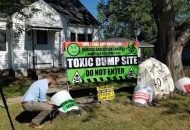Expand Access to ESOPs to Protect Americans’ Retirement Savings in a Volatile Economy
COMMENTARY

American retirees lost 23% of their 401(k) savings in 2022, the U.S. personal saving rate is barely over 5%, and ongoing volatility caused by factors like the second-largest bank failure in U.S. history and geopolitical challenges mean uncertainties for the future of our investment accounts.
Congress is looking for ways to protect the health of U.S financial markets and mitigate the risk Americans may face ahead. Expanding access to employee stock ownership plans, known as ESOPs, is a way legislators can help more employees in private businesses save and ensure a dignified retirement when those goals are far off for so many.
While no business is immune to the challenges of environmental economics, employee-owned private companies and their workers fare better than most others and are well-positioned to withstand a volatile economy. A new survey by the National Center for Employee Ownership finds workers at privately held businesses owned by their workers through ESOPs have far greater retirement security compared to American workers overall. At a time when many businesses are experiencing high turnover rates and staffing shortages, S corporation ESOPs report better employee retention, superior retirement savings among workers and a corporate culture that encourages worker satisfaction.
S corporation ESOPs have good reason to be confident about their companies’ and workers’ financial well-being: 84% of S ESOP leaders are optimistic about their business’ financial outlook, at a time when U.S. small business confidence overall is at a 10-year low.
As shown in the NCEO survey, with a median ESOP account balance of $80,500, employee-owners (most of whom also have 401(k) balances because their companies typically offer more than one retirement plan) have more than double the retirement savings of their counterparts who work at companies that aren’t ESOP-owned.
The vast majority of S ESOP business leaders believe they have an advantage when it comes to retaining employees compared to competitors. According to the new study, S corporation employee-owners are less likely to leave their jobs, with quit rates reported at roughly one-third of the national average. Private businesses that are ESOP-owned with employee ownership are also less likely to lay off workers, reporting layoff rates of just 3%, far below the national average of 10.1%.
This latest survey reaffirms what previous research has shown us about how ESOP companies and workers fare during challenging economic times. A 2022 study by NCEO found S corporation employee ownership provided exceptional financial resiliency in the face of pandemic-driven economic challenges. Likewise, a 2021 survey by John Zogby Strategies found that workers at S ESOPs reported being on significantly more stable financial ground than other U.S. workers during the COVID-19 pandemic.
New bipartisan legislation, the Promotion and Expansion of Private Employee Ownership Act of 2023, introduced by U.S. Sens. Ben Cardin, D-Md., and Steve Daines, R-Mont., in the Senate and Reps. Mike Kelly, R-Pa., and Earl Blumenauer, D-Ore., in the House, recognizes the benefits of ESOPs in private companies and would enable more companies to be employee-owned. The bill makes converting to ESOP ownership a more enticing option for retiring business owners and provides much-needed technical assistance for companies that are interested in forming an ESOP.
There’s no magic bullet to protect Americans from the risks that all investors face during times of economic downturn, but the employee ownership business model is one battle-tested tool that continues to pay off for American workers and businesses alike.
Stephanie Silverman is the president and chief executive officer of the Employee-Owned S Corporations of America, which speaks exclusively for employee-owned S corporations. Since 1998, ESCA’s membership has grown to represent more than 240,000 employee-owners in every state in the nation. ESCA company members engage in a broad spectrum of business activities and are a variety of sizes — from 25-person businesses to companies with more than 25,000 employee-owners — but all have one thing in common: a commitment to protecting the S corporation ESOP structure and promoting it so that more working Americans can become employee-owners. You can find ESCA on Twitter, LinkedIn and Facebook.
























